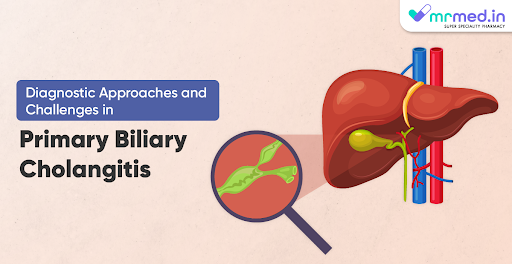Small bile ducts in the liver are destroyed in Primary Biliary Cholangitis (PBC), a chronic, progressive autoimmune liver disease. PBC diagnosis must be made as soon as possible in order to allow for prompt management and action. However, due to its vague symptoms and absence of a gold-standard diagnostic test, PBC can be difficult to diagnose. In this post, we'll examine the PBC diagnostic methods in use and talk about the difficulties in making a precise diagnosis.
Diagnostic Approaches
- Clinical Evaluation: A thorough medical history review and physical examination are often the first steps in the diagnostic process for PBC. Fatigue, itchiness, jaundice, and hepatomegaly are typical signs. It's critical to evaluate the patient's risk variables, such as age, gender, and autoimmune disease family history.
- Laboratory Testing: The diagnosis of PBC depends heavily on laboratory tests. Alkaline phosphatase (ALP) and gamma-glutamyl transferase (GGT) levels are measured as part of liver function testing. Elevated levels of these markers may be a sign of cholestasis. About 95% of patients have autoantibodies, such as anti-mitochondrial antibodies (AMA), notably anti-M2 antibodies, which are highly specific for PBC.
- Imaging Studies: The liver and bile ducts can be assessed using imaging techniques such as computed tomography (CT) scans, magnetic resonance cholangiopancreatography (MRCP), and ultrasound. These imaging techniques can identify cirrhosis, liver fibrosis, and dilation of the bile ducts, supporting the diagnosis.
- Liver Biopsy: A liver biopsy may be carried out to evaluate the level of fibrosis and inflammation in patients with suspected PBC, albeit it is not always necessary. By excluding other liver conditions, it can assist in confirming the diagnosis. However, there are hazards and restrictions associated with this invasive operation.
Challenges in Diagnosis
- Asymptomatic or Atypical Presentation: PBC may initially show no symptoms or may manifest with vague signs, which can delay diagnosis. It can be difficult to start treatment on time because patients frequently don't seek medical attention until the disease has advanced.
- Overlapping Features with Other Liver Diseases: The clinical and serological characteristics of PBC overlap with those of other autoimmune liver diseases such primary sclerosing cholangitis and autoimmune hepatitis. It is crucial to distinguish between these conditions for proper administration.
- Seronegative PBC: A tiny proportion of PBC patients may not have measurable AMA levels, which makes diagnosis more difficult. To make a diagnosis in these circumstances, a thorough evaluation that includes imaging and a liver biopsy is necessary.
Treatment of Primary Biliary Cholangitis
Treatment for PBC is primarily focused on symptom relief, slowing the disease's course, and avoiding complications. For PBC, ursodeoxycholic acid (UDCA) is the cornerstone of treatment. It aids in enhancing liver function, reducing itching, and extending life. A commonly prescribed medication for PBC is Udiliv 300mg Tablet, which contains ursodeoxycholic acid. However, some people might not benefit enough from UDCA. Additional treatments, such as the farnesoid X receptor agonist obeticholic acid (OCA), which has been licenced for second-line therapy, may be taken into account in such circumstances. The best course of treatment for end-stage PBC offers a cure through liver transplantation.
Conclusion
A prompt diagnosis of PBC is essential for effective treatment and better patient outcomes. PBC is diagnosed using a combination of clinical assessment, laboratory tests, imaging techniques, and, occasionally, liver biopsy. The diagnosis procedure is complicated, nevertheless, by issues including atypical presentation and symptoms that overlap with those of other liver illnesses. To address these difficulties and raise the diagnosis accuracy of PBC, clinicians, pathologists, and researchers must work together. This will result in better patient treatment techniques and results.
About Author: MrMed Pharmacy is a reputable and trusted pharmacy that aims to provide high-quality super specialtiy medicines to its customers. With a customer-centric approach, MrMed.in strives to create a positive and supportive environment for individuals seeking pharmaceutical services.




